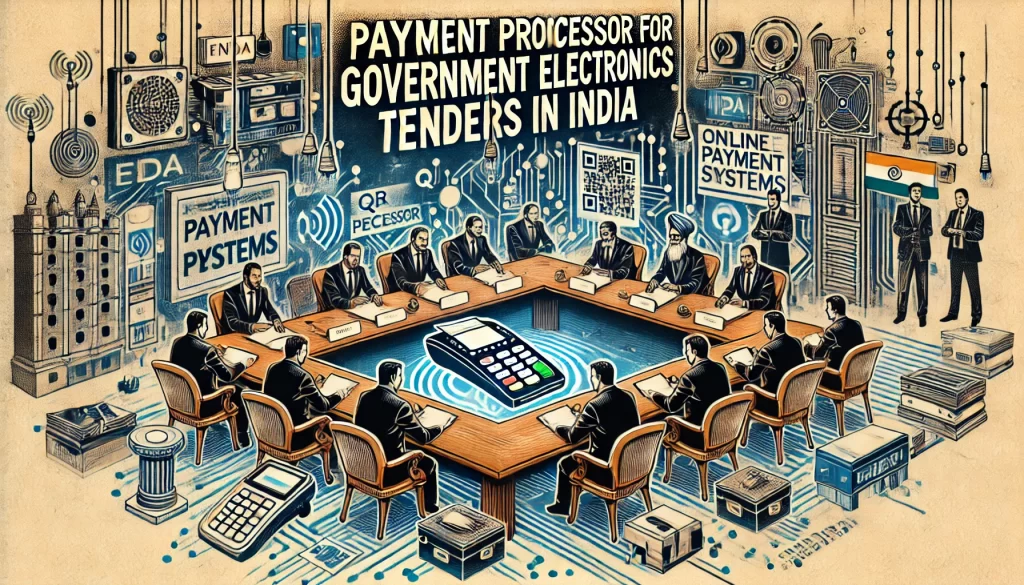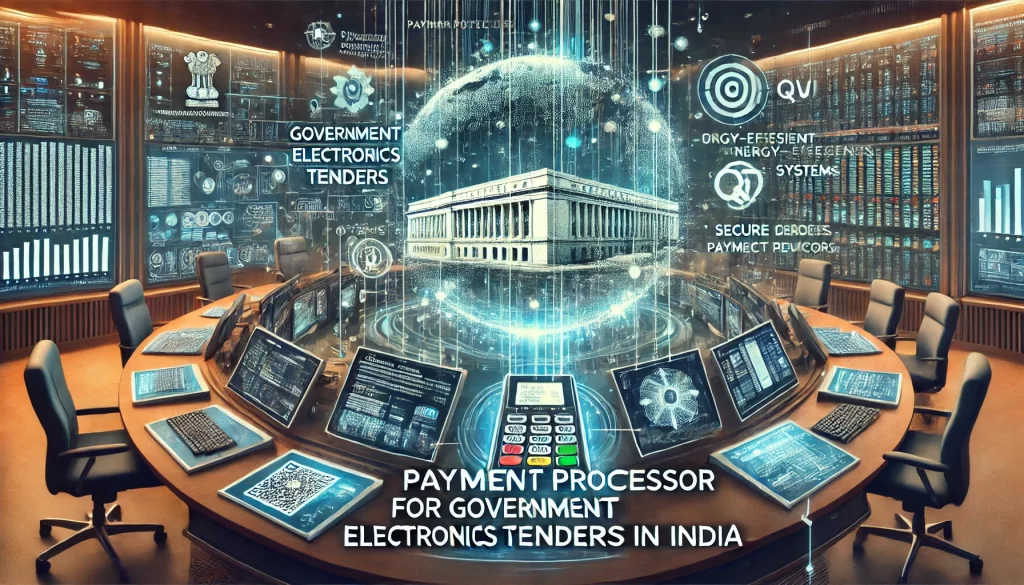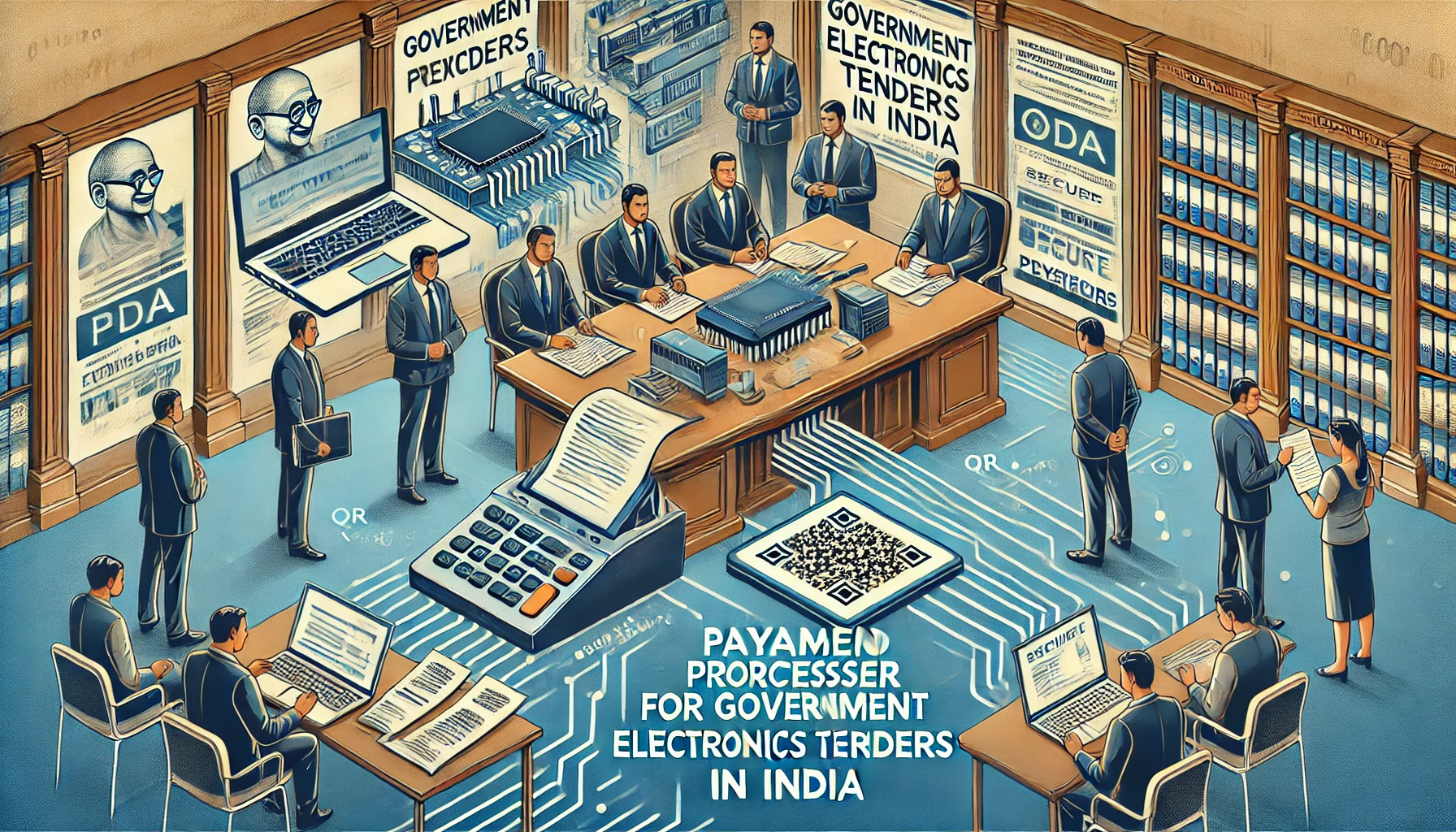Author : Shin Hari
Introduction
Handling government electronics tenders in India is no small feat, considering the scope and scale of such projects. From acquiring critical infrastructure to boosting the “Make in India” initiative, electronics tenders play a pivotal role. But there’s one key component that ensures the smooth functioning of these tenders—payment processors.
Payment processors not only facilitate secure and transparent financial transactions but also align with the government’s vision for a digitally empowered India. In this article, we’ll explore their role, benefits, challenges, and the future trends shaping this domain.
What is a Payment Processor?
A payment processor[1] is a service that handles the financial transactions involved in a purchase. In the context of government electronics tenders, payment processors are crucial for ensuring the secure and efficient transfer of funds between the government and businesses submitting bids. These transactions can range from tender application fees to bid security deposits and payments for awarded contracts.
Government Electronics Tenders: An Overview
Government tenders are essentially invitations issued by government agencies for businesses to submit bids for contracts. These tenders can range from simple purchases of goods to large-scale infrastructure projects. The Indian government has adopted a more digital and transparent approach to these tenders through the implementation of e-tendering platforms, where payment processors are integral.
In these platforms, businesses submit their bids electronically, and once the bids are accepted, payments are made through a government-approved payment system, ensuring faster and more secure transactions
Integration of Payment Processors in Government Tenders
Payment processors ensure the smooth transaction of payments in government electronics tenders. These processors handle various aspects of the payment process, such as verifying payment details, securing data, and confirming the successful transaction.
The integration of system has allowed for instant payment processing, eliminating long delays associated with traditional banking methods. The government also employs robust security protocols like encryption and multi-factor authentication to ensure the safety of transactions.
The Role of Payment Processors in Government Tenders

Payment processors are crucial for ensuring the smooth financial transaction flow between bidders and government agencies during the tender process. These systems facilitate secure, transparent, and efficient payments that are essential for both the government and the businesses involved. Without reliable payment processing systems, the tender process could face delays, fraud risks, and lack of transparency. concern in traditional tendering systems.
Types of Payment Processors Used in Government Tenders
In India, several leading payment processors are used to facilitate government transactions:
- NPCI (National Payment Corporation of India): As the central body, NPCI handles multiple forms of digital payments, such as NEFT, RTGS, and UPI. It has become one of the most popular platforms for payment processing in government tenders.
- UPI (Unified Payments Interface): UPI is a fast and secure payment[2] system that has gained immense popularity for both personal and business transactions. It allows users to transfer funds instantly using a mobile phone, making it an ideal choice for government tenders.
- Other Payment Gateways: Private payment gateways like Razorpay and Paytm are also used in some instances, providing an additional layer of convenience and security.
Case Studies: Successful Payment Processing in Government Projects
Example 1: Large-Scale Electronics Procurement
A major electronics tender[3] for upgrading data centers across India showcased the efficiency of payment processors. By leveraging secure payment gateways, vendors received payments promptly, ensuring the project was completed within the stipulated timeframe.
Example 2: Small-Scale Electronics Projects for MSMEs
MSMEs participating in government electronics tenders benefited significantly from digital payment[4] systems. Platforms like GeM enabled these businesses to receive payments on time, boosting their participation and growth.
Government Initiatives to Enhance Payment Processing in Tenders
The Indian government has launched several initiatives to promote digital payments in government tenders, including the Digital India[4] campaign, the E-Government Procurement System, and the push for cashless transactions in public services.
Opportunities for Businesses in Government Electronics Tenders
For businesses, participating in government tenders offers immense growth potential. The use of efficient payment processors makes the entire process more transparent, reliable, and accessible, opening up new opportunities for vendors to engage with the government on various projects.
How to Participate in Government Electronics Tenders
Participating in government electronics tenders requires businesses to follow a set process that includes registration on tendering portals, bid submission, and secure payment processing. Choosing the right payment processor is critical to ensuring smooth and successful transactions.

The Future of Payment Processors in Indian Government Tenders
The future of payment processors in government tenders looks promising, with continued advancements in technology and a focus on making processes even more efficient. Trends such as AI, machine learning, and blockchain are expected to further improve transaction security and streamline government procurement processes.
Conclusion
Payment processors play an essential role in the Indian government’s efforts to modernize its tendering processes. By enabling faster, more secure, and transparent transactions, they not only benefit businesses but also contribute to the overall efficiency of government procurement. As technology continues to evolve, payment processors will play an even more prominent role in driving the future of government electronics tenders in India.
FAQs
- What is a payment processor? A payment processor is a system or company that handles digital transactions, ensuring secure and smooth payments between buyers and sellers.
- How do payment processors benefit government tenders? They simplify the payment process, increase transparency, reduce paperwork, and improve the overall efficiency of the tendering process.
- What is UPI, and why is it important for government tenders? UPI (Unified Payments Interface) is a digital payment system that enables instant money transfers between banks. It is widely used in government tenders due to its convenience and security.
- Are payment processors in government tenders secure? Yes, payment processors employ advanced security measures like encryption, multi-factor authentication, and regular system updates to protect transactions.
- Can small businesses participate in government tenders? Yes, the digitization of the tender process has made it easier for small businesses to participate, offering them more opportunities to work with the government.

